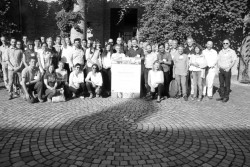European researchers tackle parasitic diseases in Europe’s farmed fish
In September, over 70 researchers involved in ParaFishControl, from 13 European countries as well as Canada, came together in Copenhagen, Denmark, to discuss their latest research findings and to map out their future research strategies. Their task - to improve understanding of fish-parasite interactions and to develop respective management tools. For example: diagnostic tests, vaccines, risk maps, and best practice handbooks and management manuals for the prevention, control and mitigation of the most harmful parasitic species affecting key European farmed fish species. ParaFishControl Project Coordinator Dr Ariadna Sitjà-Bobadilla, from Agencia Estatal Consejo Superior de Investigaciones Cientificas (CSIC), Spain explained: “This has been an exciting time for ParaFishControl! The project is only in its initial stages, but we have already made significant progress and published 11 scientific papers. The ParaFishControl published research includes: the effects of nematode worms on fish and consumer health, the role of fungal communities as suppressors of other fungi, and the decrease in intensity of infection of a gill parasite of gilthead sea bream after feeding infected fish with a mixture of compounds. We have also described, for the first time in Europe, a two-host life cycle of a parasitic myxozoan species and we have comprehensively reviewed the 'macrophages first' hypothesis for polarized immune responses”. “Another partner, the University of Santiago de Compostela (USC), has been working on turbot scuticociliatosis, a disease caused by protozoans, which has been recognized as an emerging problem, inflicting significant economic loss in the global aquaculture industry, by affecting different fish species. Researchers at USC have discovered that the antimalarial drugs chloroquine and artemisinin as well as the chemical substance curcumin which is produced by some plants inhibit some enzymes of this parasite. These findings highlight potential for treating this disease in aquaculture,” Dr Sitjà-Bobadilla added. For a list of all publications, please visit: www.parafishcontrol.eu/parafishcontrol-results2 ParaFishControl, funded by the European Union’s Horizon 2020 funding programme, has been going on since April 2015 and will continue until 2020. In that time, ParaFishControl will carry out a variety of activities to ensure the research findings are shared with a variety of stakeholders such as scientists working in academia or industry, fish farmers/growers, fish health professionals, agricultural advisors, breeders, consumers and policy makers as well as the general public. For more information, please visit www.parafishcontrol.eu or follow us on Twitter: @parafishcontrol Contact us: ParaFishControl Coordination and Management: parafishcontrol.coordination@csic.es, supported by: enric.belles-boix@inra.fr ParaFishControl Communication and Press: claudia@aquatt.ie Notes for Editors ParaFishControl is a research and innovation project funded under the EU’s Framework Programme for Research and Innovation, Horizon 2020, grant No. 634429. The project will run for five years from 2015 to 2020. The ParaFishControl consortium of 29 partners represents leading organisations in their respective fields of work from 13 different European countries. The project is coordinated by Agencia Estatal Consejo Superior de Investigaciones Cientificas (CSIC), Spain. AquaTT is the project dissemination partner.
Keywords
aquaculture, parasitic disease, parasites, breeders, fish health
Countries
Austria, Belgium, Bulgaria, Cyprus, Czechia, Germany, Denmark, Estonia, Greece, Spain, Finland, France, Croatia, Hungary, Ireland, Italy, Lithuania, Luxembourg, Latvia, Malta, Netherlands, Poland, Portugal, Romania, Sweden, Slovenia, Slovakia, United Kingdom



